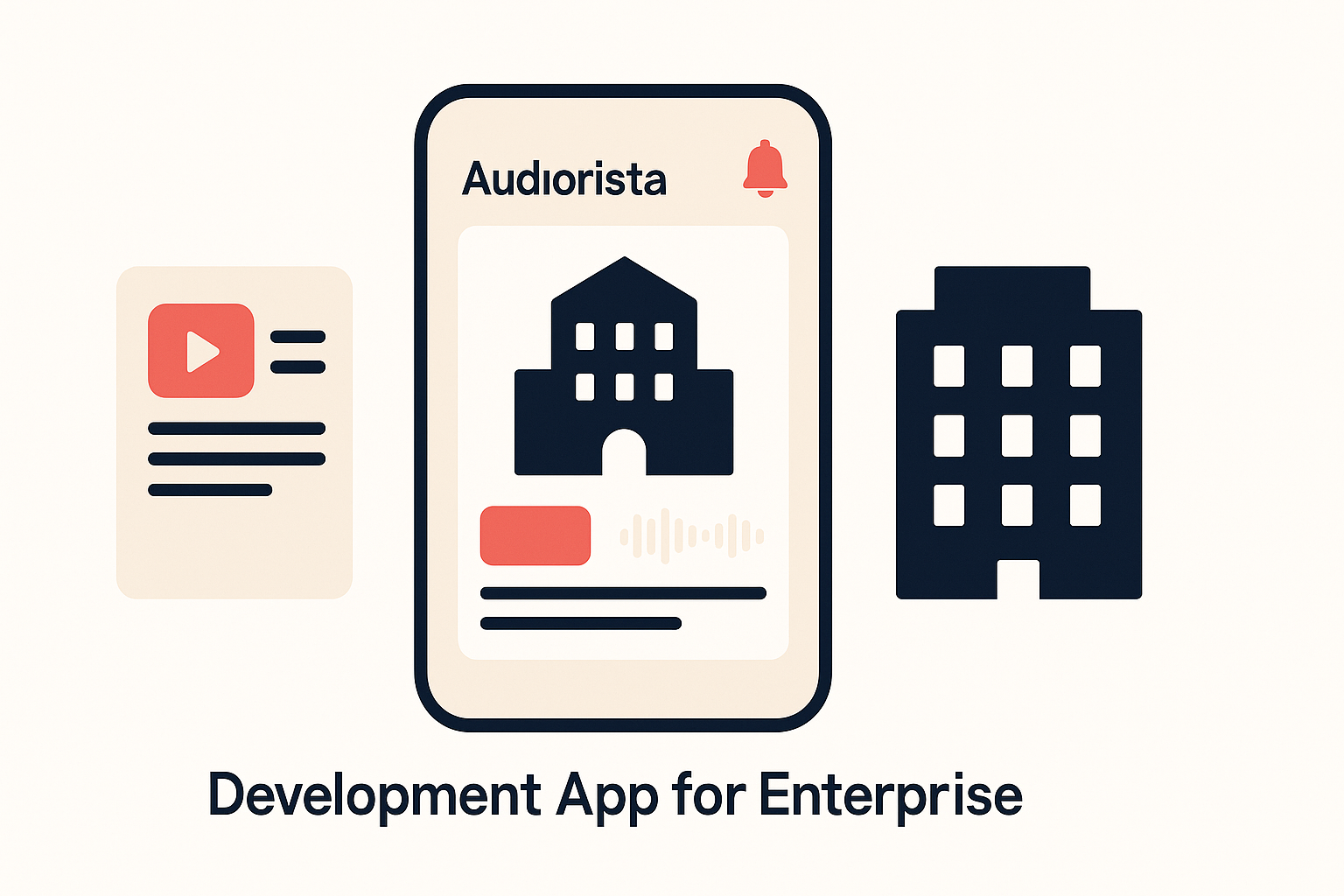Enterprise app development guide

Enterprises today face an urgent need to simplify complex workflows, respond to scaling pressures, and gain tailored digital tools that support long-term growth. Managing multiple systems, ensuring operational efficiency, and improving customer engagement can be challenging without the right solutions. That’s why enterprise app development has become a central part of digital transformation.
Audiorista empowers companies to streamline app creation by offering a no-code platform that makes it easy to build, customize, and manage applications without heavy developer overhead. With Audiorista, organizations can rapidly deploy branded apps, integrate with existing systems, and manage content efficiently. This guide will help decision-makers understand the essentials of enterprise app development, explore best practices, and learn how to select the right services and partners to ensure scalable business success.
Understanding enterprise app development
Enterprise app development refers to the process of designing, creating, and deploying software applications specifically for business use at scale. These applications are built to solve operational challenges, connect disparate systems, and improve organizational efficiency. Unlike consumer-focused applications, enterprise apps must support complex workflows, integrate with company infrastructure, and prioritize reliability.
Enterprise app development plays a core role in digital transformation strategies. It helps organizations replace outdated tools, modernize legacy systems, and establish more agile processes. Mobile apps designed for enterprise needs enhance connectivity between customers, employees, and systems, ensuring that technology actively supports growth and innovation.
Exploring custom solutions and services
Custom enterprise software solutions are tailored to address specific organizational challenges that standardized products can’t fully resolve. By aligning closely with business goals, customized applications deliver meaningful improvements to performance and operations. For example, seamless integration with existing enterprise software reduces friction between teams and enhances overall workflow efficiency.
These solutions are built for scalability, ensuring organizations can adapt as they expand and scale processes without significant redevelopment. They also help align business processes by embedding workflows, data structures, and reporting mechanisms that reflect unique organizational models. For those aiming to maintain a competitive edge, custom development ensures technology evolves in step with strategy.
Mobile app development for enterprises focuses on creating applications that extend business capabilities directly to mobile devices. Corporate mobile apps improve customer experience by offering convenient access, faster communication, and personalized interactions. At the same time, they boost workforce efficiency by giving employees mobile tools for task management, collaboration, and productivity.
Internal communication also benefits from mobile-first solutions, allowing enterprises to bridge geographical boundaries or departmental silos. For modern organizations, adopting mobile-first strategies is no longer optional. Customers and employees expect seamless access across mobile platforms, which makes mobile app development an essential pillar of enterprise growth.
When planning enterprise app projects, organizations typically seek a range of professional services designed to build and maintain robust solutions. These services commonly include:
- Consulting to define requirements and strategy.
- Design to ensure usability and fit with organizational workflows.
- Deployment to bring apps into production environments efficiently.
- Integration to connect new applications with existing systems.
- Maintenance to keep apps secure, updated, and aligned with evolving needs.
Choosing the right partner for enterprise application development involves evaluating expertise in these service areas alongside a proven ability to deliver scalable, secure, and user-friendly applications. A partner who understands industry-specific needs can help organizations avoid costly missteps while accelerating the return on investment from enterprise development.
Best practices and final thoughts
Effective enterprise app development follows a set of best practices that ensure both long-term reliability and immediate business value. These practices include focusing on user-centered design, ensuring robust security frameworks, adopting agile methodologies, and developing scalable solutions that can grow with organizational demands.
User-focused design means prioritizing interfaces and workflows that support both employees and customers with intuitive, practical features. Security is critical, as enterprise applications often handle sensitive business data and must comply with regulatory standards. Agile methodologies enable iterative progress, allowing teams to deliver usable features quickly while adapting to changing requirements. Finally, scalability ensures that applications can support growing workloads without requiring fundamental redesign.
Platforms like Audiorista allow enterprises to streamline these practices by offering a no-code approach to app development. This makes it easier to involve a broader range of stakeholders, cut development costs, and rapidly launch branded applications without compromising quality. Audiorista’s platform also supports integrations, user management, analytics, and monetization options, ensuring a comprehensive solution for enterprise needs. For a deeper understanding of how to build an app effectively, enterprises can explore additional resources. Likewise, when it comes to building and previewing branded no-code apps, Audiorista provides practical tools to simplify testing and customization before deployment.
Ready to simplify your enterprise app development? Start building and customizing your own app with Audiorista today.


